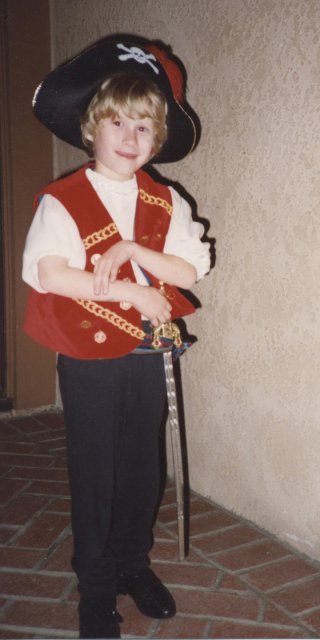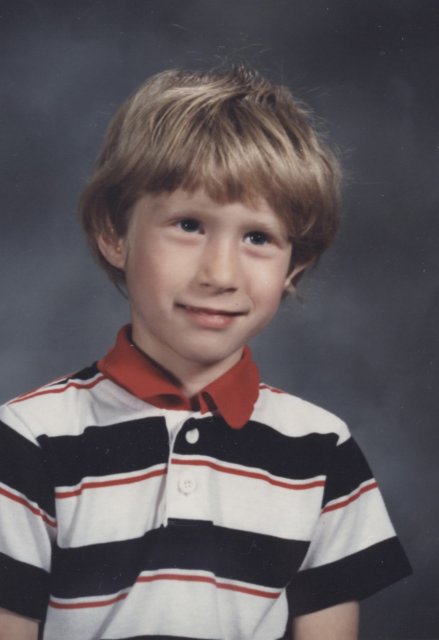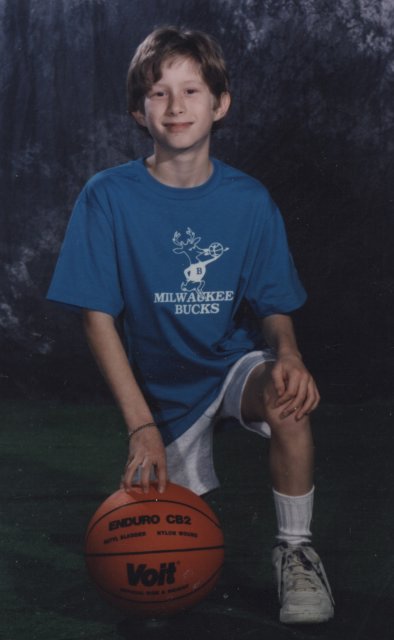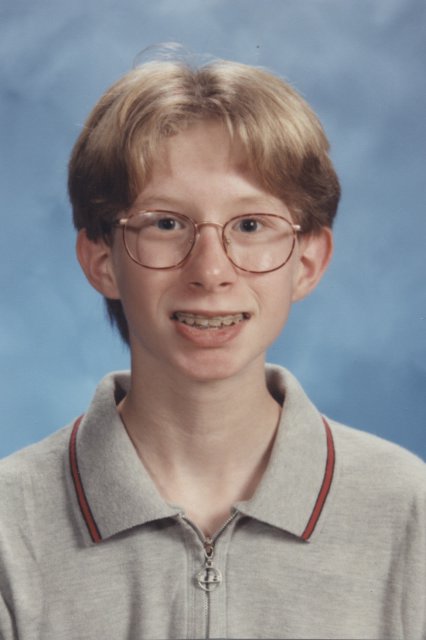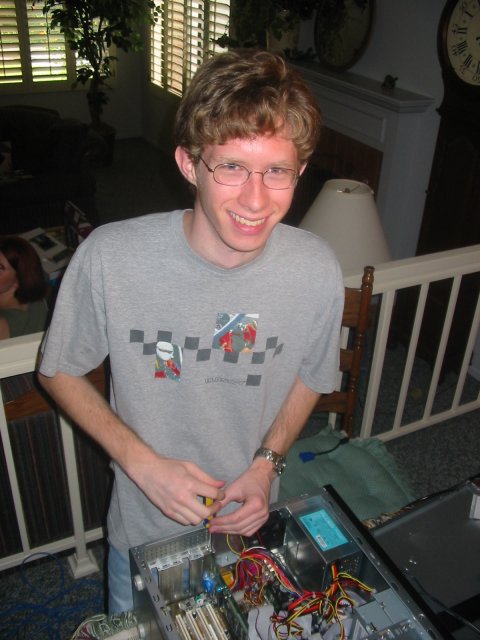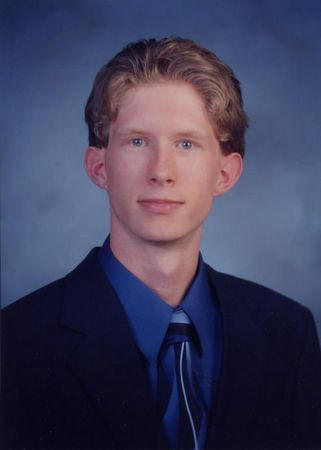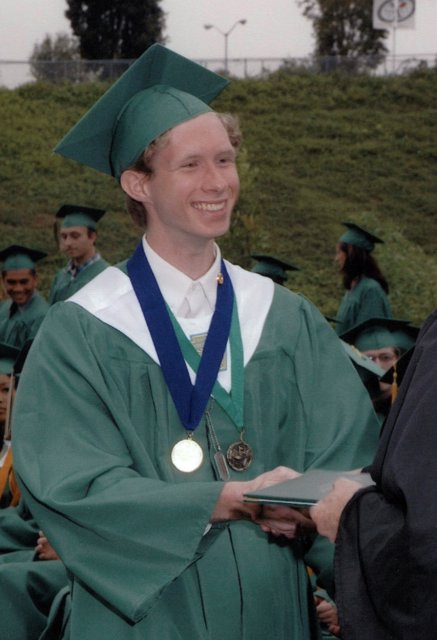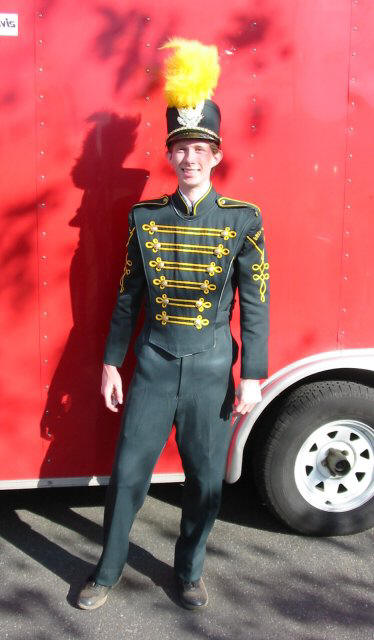|
A wonderful boy who
became a fine young man, Brandon Hampson was born on August 11,
1985, and welcomed warmly into his family by his parents and two
older sisters. He was a happy baby and a playful toddler,
though his birth weight had been just over five pounds and his
growth and development seemed somewhat slow. When he
hadn’t learned to speak by the age of three, his family grew
worried and took him to Providence Speech and Hearing for
testing. There he was diagnosed with mild to moderate
sensorineural hearing loss in both ears, probably, it was said,
due to heredity. An MRI run shortly after this showed no
brain abnormalities.
Brandon was fitted with
hearing aids, which he wore forever after without ever a single
complaint. He started preschool in a communicatively
disabled program, and for three years had one of the most
wonderful educational experiences of his life. By the time
it was over, he was ready to begin “real” school, and came home
to his neighborhood elementary. Learning here was a
struggle at first due to his late start with language, but he
still experienced great gains, starting out as a non-reader and
making 2 ˝ years progress in the first year alone. It was
always necessary for him to work hard at expressive language,
but by the time he was in fifth grade, he nearly always managed
to make honor roll, and thought of himself as one of the “smart
kids.”
During his elementary
years, Brandon made friends, enjoyed Boy Scouts, played Little
League and NJB Basketball and pursued hobbies including inline
skating, building with Lego blocks and playing video games.
Although he never liked music as a child, he joined the
elementary band playing trumpet, and from then on, music became
one of his passions. He always was close to his sisters,
and the family made a point of having dinner together and taking
long vacations to far-away places, eventually visiting 36
states, eastern and western Canada and Europe.
In junior high, Brandon
was shy but well liked, and his family always was amazed by how
many kids knew him and stopped to say “hi” when they went out.
He was one of nine seventh graders named as school-wide students
of the month, and the very first eighth grader (from a class of
500) selected as Rotary Junior Citizen of the Month. He’d
had to struggle as a kid, had a strong sense of the importance
of helping others and invariably was kind to all. He
joined the junior high band (now playing drums), was selected
for National Junior Honor Society and volunteered with the
school tutoring program every day during lunch. He was a
good student, and at graduation received several honors and
savings bonds. In his spare time, he continued in Scouts,
doted on computers, loved composing music and began studying
karate at a wonderful studio.
Brandon’s freshman year
in high school was a difficult one, as many changes challenged
his household. He always had remained close to his
sisters, but for the first time they both were away at college.
Mom, who all his life had been there when he got home from
school, returned to teaching full time to help support their
tuition. He registered for a full schedule of classes and
chose to enroll in marching band and cross-country running, two
extremely time-consuming activities. Many of his junior
high friends had not gone on to Brea Olinda High School, and the
network of friends he had left broke apart that fall.
About the same time, his only grandpa got sick, was diagnosed
with cancer, came to live in our home and died almost as soon as
he arrived. Brandon struggled with sadness and was often
ill, yet persevered. Despite encouragement to lighten his
schedule, he didn’t think it was right to quit something once
he’d begun, and stuck with both band and cross country through
the end of their seasons.
By sophomore year, some
changes were made. Mom gave up her job and Brandon
lessened his activity load. From here on he would focus on
things he loved and work to find ways---even if he had to invent
them---to be able to do them. As a member of the
hearing-impaired community who’d grown up without learning ASL,
he pushed to be allowed to study sign language in high school,
so that he could better relate to others like him. He had
a tutor freshman year, but loved studying the subject so much
that he convinced school administrators to offer an after-school
ASL class the following year. Nearly 30 students signed on
for the new credit course. He volunteered to serve as a
student member of the WASC (Western Association of Schools and
Colleges) accreditation study team, and loved the many months of
interaction he had with students, staff members and parents
assessing his school’s strengths and weaknesses.
He discovered the school
had no viable internet presence, and proposed that that should
change, finally persuading the vice principal to let him have a
crack at it. By junior year, the school’s website had been
transformed into a widely used communication tool, with Brandon
as its webmaster. His shared his technology expertise on a
regular basis at school, helping staff members set up hardware,
install software and troubleshoot systems, preparing all
the charts and graphs for the final WASC report, and assisting
the counseling department in creating three separate state and
national service “report cards,” all of which won major awards.
He provided technical assistance to the school district,
scanning historical photos onto discs and assisting with the
district’s 100-year anniversary celebration book. He
designed the T-shirts all senior students wore to their grad
night. He did all the technology support for two of his
mother’s school board campaigns, including maintaining websites
and formatting all her published materials.
Outside of technology,
his major love in high school was instrumental music. A
four-year member of the BOHS Marching Band (carrying the biggest
bass drum) and percussion ensemble, he also enrolled some years
in concert band and wind ensemble. He was a band officer,
cataloged the band music, worked every fund raiser, came early
and stayed late to help load and pack up for every football
game, field show, parade, concert and competition, and just
generally gave his heart to the group in all its efforts.
It was here that his friends were and here that he learned what
it was like to be part of a group that worked hard and met with
success. His last act of volunteerism, right before he was
diagnosed, was serving as a percussion instructor at summer band
camp.
During his free hours,
he socialized some with friends, going to band parties or
organizing Friday afternoon runs to Baja Fresh. He learned
to drive late, but got a new car during senior year, and loved
to take the underclassmen home from school. He didn’t go
out all that much, but had friends over to play computer games,
read a lot, kept up with politics and current events, went to
karate and worked for hours on computer projects. When his
sisters were home, he spent a great deal of time with them.
When they weren’t, he was the kid most likely to be seen with
Mom and Dad, at Fry’s or Best Buy, eating pizza, going to the
movies, helping around the house or just “hanging out.” He
formed strong adult friendships with his long-time
hearing-impaired teacher, the high school assistant principal
with whom he worked on the website, the band and percussion
directors and the paid tech staff at school, and enjoyed
socializing with them as well.
Overcoming the odds (an
astonishingly few hearing-impaired students do well in high
school and go on to college), Brandon became a good student.
He took honors and AP classes, generally earned A’s and B’s and
graduated with a 3.6 GPA He didn’t drive himself as hard
as his sisters had, but enjoyed his time, and balanced homework
with the real contributions he was making to school and
community. He seemed extremely well adjusted for a young
man of his age, and impressed kids and adults alike with his
friendly demeanor and humble yet self-assured ways. He
was one of the first four students in his class inducted into
National Honor Society, and was honored at graduation with the
Mayor’s Youth Community Service Award (for 500 hours of
volunteerism), the Marine Corps Semper Fi award (for musical
excellence) and a special first-time technology award created
just for him by the school’s administration. In honor of
his contributions, the PTSA also later recognized him with its
honorary service "very special person" award. He was
accepted at every college he applied to, but settled on Chico
State. The town and campus reminded him of Davis (where
his oldest sister had gone) and the school offered a rare
business administration-computer systems management major that
seemed tailor made for him.
He spent the summer
following graduation engaged in volunteer work and polishing up
his academic skills, getting some tutoring in math and working
with Mom on English. He helped out enormously when the
local historical society dedicated its new museum, gave two full
weeks to band camp, and had the time of his life at SuperCamp!
College Forum in Colorado Springs, the first time he’d been out
of state alone. He turned 19 in August, and was poised to
begin a new chapter in his life when everything suddenly changed
in the space of an afternoon.
He’d had an eye exam in
early August, but when his contact lenses arrived, something
didn’t seem quite right. He assumed the prescription was
off a bit, but was temporarily preoccupied and put getting it
fixed on the back burner. When band camp was over, he
drove himself to the optometrist, and learned that the problem
was more complex. His suddenly “uncorrectable” vision led
him to a neurologist, into a series of ever-larger MRI machines
and finally to the offices of two neurosurgeons, who determined
that only a look inside his skull would do. Dr. Keith
Black of Cedars-Sinai, reputedly one of the world’s finest brain
surgeons, performed a biopsy by full craniotomy on September 10,
and learned the golf-ball-sized tumor behind his left eye was
Anaplastic Astrocytoma.
Having cancer at 19
would have been bad enough, but two days later he began to
hemorrhage. He coded out in the CAT scan, and emergency
surgery was needed to relieve the swelling in his brain.
The left front portion of his skull had to be removed, but
he survived, even though the hemorrhage extended from the
temporal lobe all the way to the basal ganglia. He was in
ICU for more than two weeks, then a regular room and then rehab,
altogether spending nearly two months in the hospital. He
woke up 20 pounds thinner, with significant vision and
short-term memory loss, as well as major weakness on his right
side. He was unable to walk, swallow well or use his
dominant hand. He had to have a tracheostomy and then a
feeding tube, then radiation and chemotherapy. Slowly and
with great effort (as well as the help of some wonderful
therapists), he began working to get his life back. He lifted
more and walked farther than anyone ever asked, and slowly
earned his freedom from a wheelchair. He did speech
exercises again and again to strengthen his “paralyzed” throat,
and got his swallow back in two months instead of the six months
to a year the specialist predicted. No matter how tired he
was, he never complained, always worked hard and invariably was
pleasant to all who helped him. Not surprisingly, he
became a favorite wherever he went. He continued on
chemotherapy, and MRIs showed his tumor to be steadily
shrinking, progress his doctors called “amazing” and even
“miraculous.” By March it no longer could be seen.
At home he continued to
progress, walking more than a mile a day, eating well, taking up
meditation with guided imagery, and doing all that he could to
get well. He was strong enough by February to have the
missing “bone flap” restored with a prosthetic piece, and seemed
to recuperate better than expected. He had five wonderful
weeks, but then Staph infection set in, and another surgery was
needed to take the prosthesis out. He was on IV
antibiotics for a month, but didn’t seem to get well, and began
to experience pain in his back and legs. Soon he was back
in the hospital, this time to have a shunt installed to relieve
fluid build up in his brain. The MRI taken just prior to
this surgery revealed some startling news, as the cancer which
had seemed to be well in retreat now appeared active throughout
his nervous system. There were several new spots in his
brain and, for the first time, lesions also appeared on his
spine. The entire lining of his brain and spinal column
glowed, seemingly coated with a covering of cancerous cells.
He was in the hospital
for another two weeks, and came home significantly weaker and
thinner than ever before. He began a new round of therapy,
with whole-brain radiation and radiation to almost his entire
spine, along with chemotherapy. Every doctor and therapist
he saw seemed to think he’d be devastatingly ill from side
effects, but all he experienced was fatigue and a little dry
throat. He never even lost his hair. He was very
tired, but he still worked as much as he could to do well,
eating everything placed before him and exercising all that he
could. He continued to be the same sweet, positive,
uncomplaining young man he always had been, one who was deeply
loved by his family, his friends and many, many people in his
community, as well as the wider world.
From the time he was
first diagnosed, so many people were interested in his welfare
that Mom and Dad had to start e-mail updates because they just
couldn’t keep up with the phone calls. Throughout the
months, these communications continued, and Brandon’s upbeat
attitude and fighting spirit inspired scores of people, many of
whom forwarded them on to others around the globe. The
friends he had, and the friends he made after his illness became
known, showered him with cards and calls, visits and good
wishes, and their prayers were felt both by him and his family.
Although his energy and
his ability to concentrate sometimes were sadly limited, during
the final days of his life, Brandon enjoyed visits with many old
friends. In early June, he was thrilled to have the Brea
Olinda High Marching Band play a short concert in his honor
right in front of his house. In a ceremony held at his
bedside June 22, he was deeply touched to be awarded his First
Degree Black Belt in karate. Bestowed by the leaders of
Fullerton’s American Martial Arts Academy, it recognizes both
rank advancements made before he became ill and the great grace
and strength of character he showed in the months following his
diagnosis.
Brandon passed from this
world on the afternoon of June 26, 2005. Even in death, he
continued his lifelong mission of “helping people,” by donating
his corneas---all that he had left to offer---so that someone
he’d never met might regain the precious gift of sight.
|
